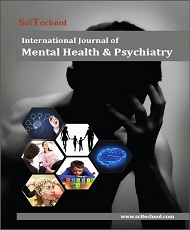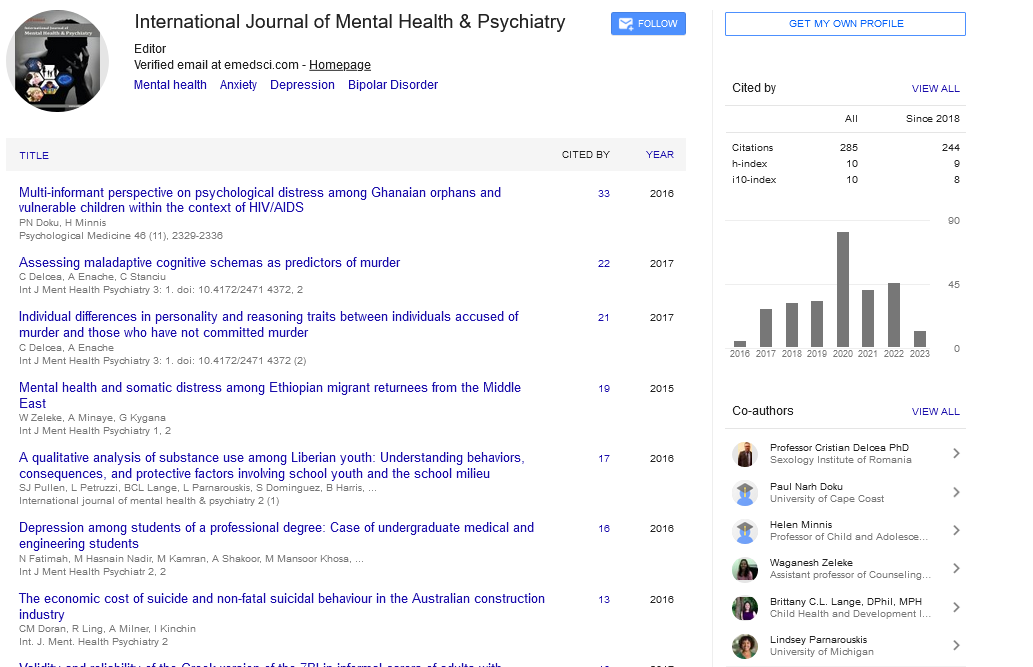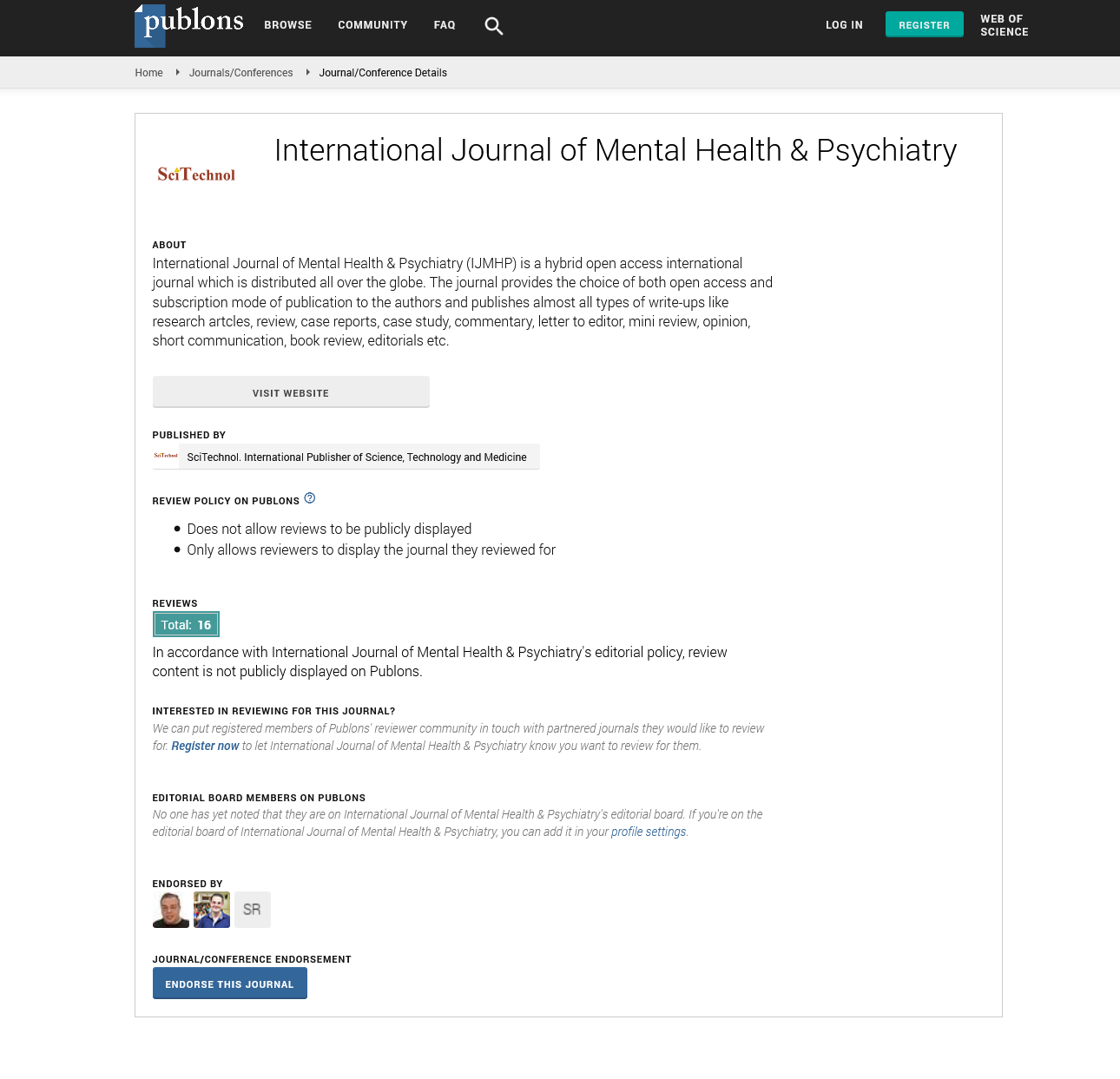About the Journal

International Journal of Mental Health & Psychiatry (IJMHP) is a hybrid open access international journal which is distributed all over the globe. The journal provides the choice of both open access and subscription mode of publication to the authors and publishes almost all types of write-ups like research articles, review, case reports, case study, commentary, letter to editor, mini review, opinion, short communication, book review, editorials etc.
The journal’s Editorial Board is composed of international experts from the related field who have committed to seeking out excellent work from a range of sources and theoretical perspectives and also to publish high-quality, thought-provoking work that will have a direct impact on clinical practice & scientific society.The journal publishes rigorous peer reviewed research & other scholarly articles which adds new knowledge to the field and has the potential to improve the lives of those affected by mental health problems.
Submit manuscripts at Online Submission System Mail us at manuscript@scitechnol.com
The journal follows double blind peer review process. Manuscripts submitted by authors will be evaluated on Editorial Manager® System by Editors & reviewers of particular expertise in the same field to ensure that the published articles are of high quality with accurate and reliable information & data, which reflect solid scholarship. Editors can manage the whole submission, review, revision and publishing process, however at least two independent reviewer's approval followed by the Editor is required for the acceptance of any citable manuscript.
The following classifications and topics related to it will be considered for publication in IJMHP.
Behavioural and Personality disorders
The behavioral disorders are the disorders related with the behaviour of a person & requires mental health assessments. It is also termed as disruptive behavioral disorders and personality disorder is a condition in which there is a specific pattern of behaviour which can be maladaptive but typically apparent & causes long term difficulties in normal functioning in society.
Autism and Developmental Disorders
Developmental disorders are a group of conditions which originates in the childhood & leads to serious impairment in various areas. It affects the normal development of a person from childhood.
Autism is a complex neurobehavioral disorder that includes impairments in social interaction and developmental language and communication skills combined with rigid, repetitive behaviors. The disorder covers a large spectrum of symptoms, skills, and levels of impairment. It ranges in severity from a handicap that somewhat limits an otherwise normal life to a devastating disability that may require institutional care.
Psychiatry Cases
The Psychiatrists face few challenging cases in their career. Those real life cases are a medium for the psychiatry trainees to learn & grow. The identity of the patients are always altered or remain hidden. The cases are featured because most of them involves a diagnostic or therapeutic diemma.
Schizophrenia
Schizophrenia is a mental disorder that generally appears in late adolescence or early adulthood - however, it can emerge at any time in life. It is a mental disorder often characterized by abnormal social behavior and failure to recognize what is real. It is one of many brain diseases that may include delusions, loss of personality (flat affect), confusion, agitation, social withdrawal, psychosis, and bizarre behavior. Individuals with schizophrenia may hear voices that are not there. Some may be convinced that others are reading their minds, controlling how they think, or plotting against them. This can distress patients severely and persistently, making them withdrawn.
Post-traumatic Stress disorder
Post-traumatic stress (PTS) is a mental health condition that's triggered by a terrifying event - either experiencing it or witnessing it. Symptoms may include flashbacks, nightmares and severe anxiety, as well as uncontrollable thoughts about the event. It develops after a terrifying ordeal that involved physical harm or the threat of physical harm. The person who develops PTS may have been the one who was harmed, the harm may have happened to a loved one, or the person may have witnessed a harmful event that happened to loved ones or strangers.
Mental Health Statistics
It is estimated that about 25% of population will experience some kind of mental health problem in the course of a year, with mixed anxiety and depression and women are found to be the most common victims then men and about 10% of children suffer from mental health disorders. Mental health problems are found in people of all ages, regions, countries and societies. Suicide remains the most common cause of death in men under the age of 35. Schizophrenia is a serious disorder of the mind and brain but it is also highly treatable - yet the facts around it make for alarming reading.
Bipolar disorder
Bipolar disorder formerly known as bipolar affective disorder and manic depression, is a mental illness that brings severe high and low moods and changes in sleep, energy, thinking and behavior. In bipolar disorder, the dramatic episodes of high and low moods do not follow a set pattern. People who have bipolar disorder can have periods in which they feel overly happy and energized and other periods of feeling very sad, hopeless, and sluggish. In between those periods, they usually feel normal. You can think of the highs and the lows as two "poles" of mood, which is why it's called "bipolar" disorder.
Psychiatric Care and Rehabilitation
Psychiatric rehabilitation, also known as psychosocial rehabilitation, and sometimes simplified to psych rehab by providers, is the process of restoration of community functioning and well-being of an individual diagnosed in mental health or mental or emotional disorder and who may be considered to have a psychiatric disability. Society affects the psychology of an individual by setting number of rules, expectations and laws. Psychiatric rehabilitation work is undertaken by rehabilitation counselors, licensed professional counselors, psych rehab consultants or specialists, university level Masters and PhD levels, classes of related disciplines in mental health and community support or allied health workers represented in the new direct support professional workforce.
Dementia and Alzheimer
The symptoms of this disease is it damage the brain results in memory loss,difficulty in remembering information and learning.The symptoms are different according to the individuals and area of brain affected. Dementia is a syndrome caused by brain cell death. Neurodegenerative disease is behind most dementias. The word dementia describes a set of symptoms that may include memory loss and difficulties with thinking, problem-solving or language. Dementia is caused when the brain is damaged by diseases, such as Alzheimer's disease or a series of strokes. Alzheimer's disease is the most common cause of dementia but not all dementia is due to Alzheimer's.The symptoms of this disease is it damage the brain results in memory loss,difficulty in remembering information and learning. The symptoms are different according to the individuals and area of brain affected.
Depression and Anxiety
Depression is a state of low mood and aversion to activity that can affect a person's thoughts, behavior, feelings and sense of well-being. People with depressed mood can feel sad, anxious, empty, hopeless, helpless, worthless, guilty, irritable, ashamed or restless. Depressed mood is a feature of some psychiatric syndromes such as major depressive disorder but it may also be a normal reaction to life events such as bereavement, a symptom of some bodily ailments or a side effect of some drugs and medical treatments.
Anxiety is a feeling of worry, nervousness, or unease about something with an uncertain outcome and strong desire or concern to do something or for something to happen. Anxiety can be appropriate, but when experienced regularly the individual may suffer from an anxiety disorder. test anxiety, mathematical anxiety, stage fright or somatic anxiety. Another type of anxiety, stranger anxiety and social anxiety are caused when people are apprehensive around strangers or other people in general.
Cognitive disorder
Cognitive disorders are mental conditions that cause people to have difficulty thinking clearly and precisely. Although symptoms of cognitive disorders vary, they are generally marked by impaired awareness, perception, reasoning, memory and judgment. The four major categories of cognitive disorders are: delirium, dementia, amnesia and cognitive disorders not otherwise specified. A wide variety of factors can lead to cognitive disorders, including general medical conditions, brain infections and head injury.
Hyperactivity disorder
Hyperactivity disorder is a neurodevelopmental psychiatric disorder in which there are significant problems with executive functions that cause attention deficits, hyperactivity, or impulsiveness which is not appropriate for a person's age. These symptoms must begin by age six to twelve and persist for more than six months for a diagnosis to be made. In school-aged individuals inattention symptoms often result in poor school performance. Although it causes impairment, particularly in modern society, many children with hyperactivity disorder have a good attention span for tasks they find interesting.
Child and Adolescent Psychiatry
The branch of psychiatry that specializes in the study, diagnosis, treatment, and prevention of psychopathological disorders of children, adolescents, and their families, child and adolescent psychiatry encompasses the clinical investigation of phenomenology, biologic factors, psychosocial factors, genetic factors, demographic factors, environmental factors, history, and the response to interventions of child and adolescent psychiatric disorders. Child psychiatry includes medication to help control or minimize certain behaviors or thoughts.
Suicidology
Suicidology is the scientific study of suicidal behaviour and suicide prevention. There are many different fields and disciplines involved with suicidology, the two primary ones being psychology and sociology. Every year, about one million people die by suicide, which is a mortality rate of sixteen per 100,000 or one death every forty seconds. Suicide is largely preventable with the right actions, knowledge about suicide, and a change in society's view of suicide to make it more acceptable to talk about suicide.
Forensic psychiatry
Forensic psychiatry is a sub-speciality of psychiatry and is related to criminology. It encompasses the interface between law and psychiatry. A forensic psychiatrist provides services – such as determination of competency to stand trial – to a court of law to facilitate the adjudicative process and provide treatment like medications and psychotherapy to criminals. Forensic psychiatrists work with courts in evaluating an individual's competency to stand trial, defences based on mental disorders (i.e. the insanity defence), and sentencing recommendations. There are two major areas of criminal evaluations in forensic psychiatry. These are Competency to Stand trial (CST) and Mental State at the Time of the Offence (MSO).
Social and Geriatric Psychiatry
Geriatric psychiatry may be defined as the mental & emotional well being of elderly population with social support & an ideal environment. The social well being plays an important role in geriatric well being. Social psychiatry combines a medical training and perspective with fields such as social anthropology, social psychology, cultural psychiatry, sociology and other disciplines relating to mental distress and disorder. It focuses on the interpersonal and cultural context of mental disorder and mental wellbeing.
Psychological disorders and Psychotherapy
Psychological disorder is a condition in which there is a disorganization of personality, mind and emotions to seriously impair the normal psychological functions of the individual. And the therapy in which a patient suffering from psychological disorder expresses his feeling to a psychiatrist, counselor, clinical social worker or any other eligible person.
Arts in Psychotherapy
Art perception relies on a dialogical communication between the artist, the audience, and the cultural tradition that allows for new interpretations to be made and new meanings to be generated. Art perception relies on a dialogical communication between the artist, the audience, and the cultural tradition that allows for new interpretations to be made and new meanings to be generated.
Mental Disorders
Mental disorder or mental illness is a condition in which, there is a disorganization of personality, mind and emotions to seriously impair the normal psychological functions of the individual. The scientific study of mental disorders is called psychopathology.
Substance abuse and Addictive behaviour
Substance abuse is a disorder characterised by excessive use of habit forming drugs or misuse of over the counter medicine, illegal use of drugs which in turn leads to severe addiction and dependence with many negative consequences.
Addictive behaviour is a concept that was formerly used to explain addiction as the result of pre-existing character defects in individuals. This hypothesis states that there are common elements among people with varying addictions that relates to personality traits.
Journal Impact Factor
2016 Journal Impact Factor is the ratio of the number of citations achieved in the year 2016 based on Google Search and Google Scholar Citations to the total number of articles published in the last two years i.e. in 2014 and 2015. Impact factor measures the quality of the Journal. If ‘X’ is the total number of articles published in 2014 and 2015, and ‘Y’ is the number of times these articles were cited in indexed journals during 2016 then, impact factor = Y/X.
Fast Editorial Execution and Review Process (FEE-Review Process):
International Journal of Mental Health & Psychiatry is participating in the Fast Editorial Execution and Review Process (FEE-Review Process) with an additional prepayment of $99 apart from the regular article processing fee. Fast Editorial Execution and Review Process is a special service for the article that enables it to get a faster response in the pre-review stage from the handling editor as well as a review from the reviewer. An author can get a faster response of pre-review maximum in 3 days since submission, and a review process by the reviewer maximum in 5 days, followed by revision/publication in 2 days. If the article gets notified for revision by the handling editor, then it will take another 5 days for external review by the previous reviewer or alternative reviewer.
Acceptance of manuscripts is driven entirely by handling editorial team considerations and independent peer-review, ensuring the highest standards are maintained no matter the route to regular peer-reviewed publication or a fast editorial review process. The handling editor and the article contributor are responsible for adhering to scientific standards. The article FEE-Review process of $99 will not be refunded even if the article is rejected or withdrawn for publication.
The corresponding author or institution/organization is responsible for making the manuscript FEE-Review Process payment. The additional FEE-Review Process payment covers the fast review processing and quick editorial decisions, and regular article publication covers the preparation in various formats for online publication, securing full-text inclusion in a number of permanent archives like HTML, XML, and PDF, and feeding to different indexing agencies.






